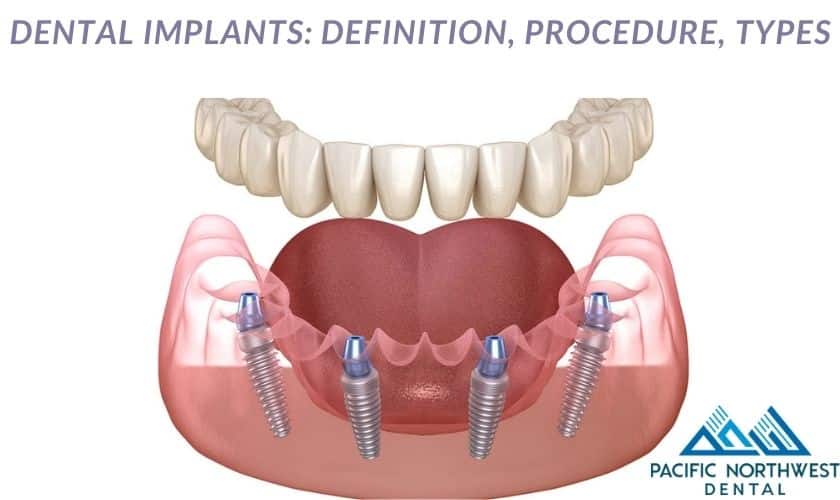
Implant dentistry has gone a long way in helping to replace missing teeth that will look like your natural teeth. These help to improve the health of your teeth and gums and reduce further oral health issues. Our dentists at Pacific Northwest Dental have provided a few basic things that you must know about dental implants in this blog.
What Are Dental Implants?
Dental implants are metal devices that are surgically attached to the jawbone beneath the gums and used to support your replacement teeth. Osseointegration is the process through which these dental implants get connected to your bone (the metal implants naturally integrate with your bone). This process creates a steady foundation on which you may rely when eating and speaking.
What Are The Different Types Of Dental Implants?
Dental implants are available in various shapes and your Beaverton dentist will help you select the one that best suits your needs. There are two major types of implants – endosteal and subperiosteal.
Endosteal Implants
Your dentist in Beaverton will place endosteal implants precisely on your jawbone and they are usually produced from titanium with their shape being like a screw. Endosteal implants are commonly used in dental implant procedures because of their high success rate. As soon as the gum tissue is healed, another surgery will be carried out to provide upright support to the implant. Lastly, an artificial tooth will be fixed to the upright support and if more than one tooth is being replaced, they may be grouped into a denture or bridge.
Subperiosteal Implants
These implants are placed on your jawbone but under your gum tissue. They are mostly used for patients who do not have enough jawbone to support implants. And cannot go through the process of bone augmentation. When the gum heals up, the metal frame used as the implant will fix your jawbone. And the upright support fastened to the frame will shoot out from the gums. The replacement teeth will be mounted on it.
How Do Dental Implants Work?
- Dental implants placed by your Beaverton dentist will give the right support to artificial teeth because they blend with your jawbone properly. If a partial denture or bridge is affixed to the implant, it will not shift or slip in your mouth, particularly when you are speaking or eating. This helps the bridge and denture as well as crowns that are individually placed on the implants, making them feel more natural than expected.
- Due to one issue or another, ordinary dentures and bridges are not ideal for some people because they won’t be comfortable for them. Moreover, a bridge needs to be fixed to adjacent teeth to the missing one to get support and this can affect the effective functioning of these teeth supporting the bridge. Dental implants are very beneficial because there is no need to prepare adjacent teeth for any support.
- To get dental implants by a good implant dentist in Beaverton, your gums must be healthy and your jawbone must be adequate to support the implant. In addition, you must be committed to keeping them as healthy as possible at all times. Implants can be more expensive than other tooth replacement options, but their results are usually outstanding.
We hope this blog has helped you to learn more about dental implants. Book an appointment with us at Pacific Northwest Dental if you are looking for the best dental implants in Beaverton, OR.
